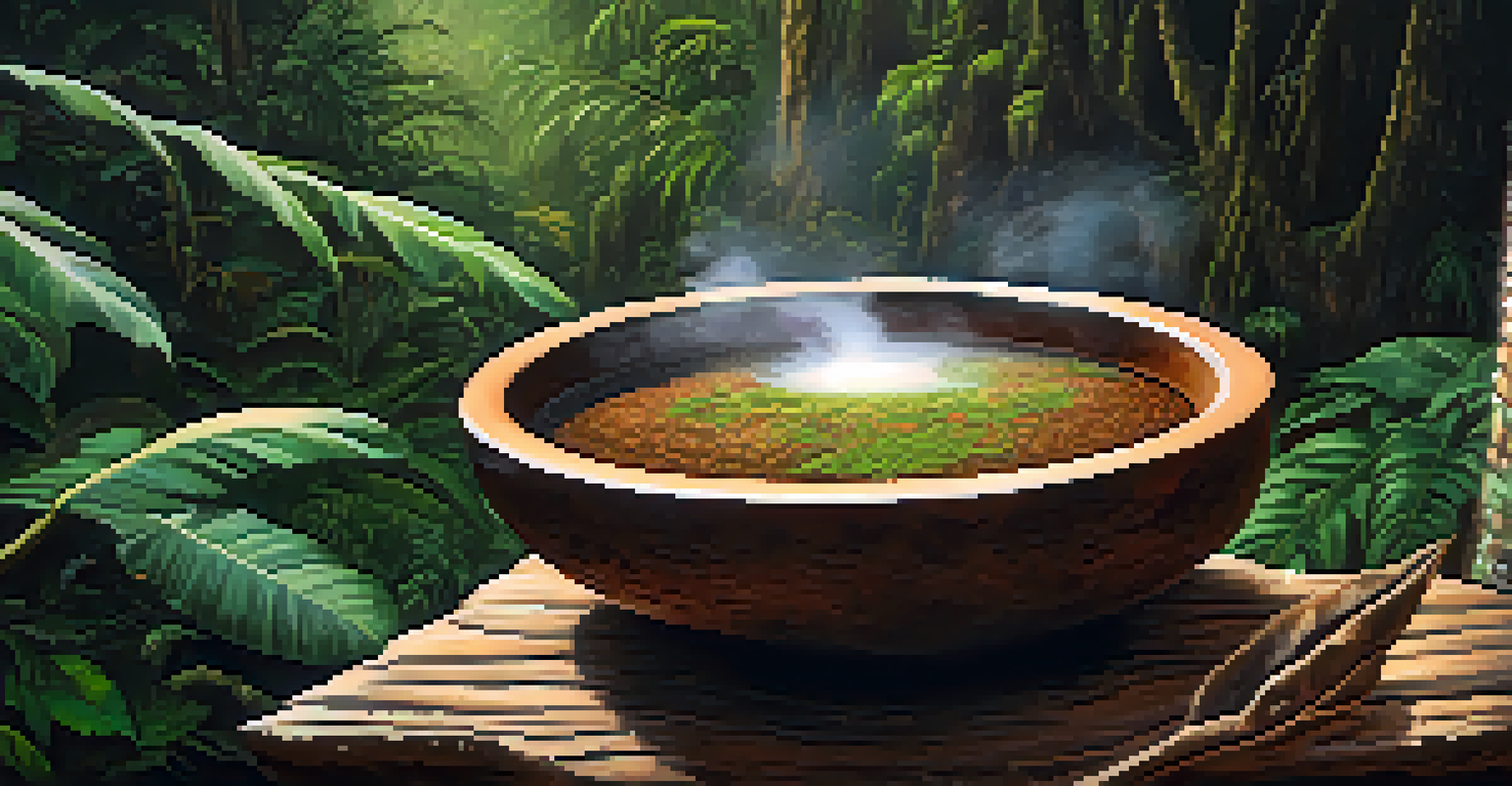Integrating Ayahuasca Therapy into Contemporary Healing

Understanding Ayahuasca: A Brief Overview
Ayahuasca is a traditional Amazonian brew made from the Banisteriopsis caapi vine and the Psychotria viridis leaf, known for its psychoactive properties. For centuries, indigenous cultures have used this potent concoction in spiritual rituals and healing ceremonies. It’s renowned for inducing profound altered states of consciousness that can lead to deep introspection and emotional healing. Understanding its cultural significance is crucial as we explore its integration into modern therapy.
The experience of Ayahuasca allows one to confront the deepest parts of oneself, leading to profound transformation and healing.
In these ceremonies, participants often experience visions and emotional releases, providing insights that can be transformative. These journeys can facilitate the exploration of personal traumas, fears, and unresolved conflicts, often leading to a sense of clarity and purpose. As the Western world increasingly recognizes the importance of mental health, the potential of Ayahuasca as a therapeutic tool has gained attention.
However, it’s essential to approach Ayahuasca with respect and understanding, recognizing that it is not a cure-all. The experience can be intense and may not be suitable for everyone, particularly those with certain mental health conditions. Thus, a nuanced understanding of both the benefits and risks is vital for integrating it into contemporary healing practices.
The Rise of Integrative Healing Approaches
Integrative healing approaches combine traditional and modern therapies, recognizing the mind-body connection. This trend has emerged as more people seek holistic solutions for their mental and emotional health. By incorporating practices such as meditation, yoga, and even plant medicine like Ayahuasca, individuals can address their issues from multiple angles.

This holistic perspective aligns well with the principles of integrative medicine, which emphasizes treating the whole person rather than just symptoms. People are increasingly aware that emotional and physical health are interconnected, prompting a shift towards therapies that address both. This evolution in healing practices encourages the exploration of unconventional methods, leading to the re-evaluation of Ayahuasca’s role.
Ayahuasca's Healing Potential
Ayahuasca therapy may offer significant relief from emotional and psychological issues, promoting self-reflection and well-being.
As this trend grows, practitioners are beginning to incorporate Ayahuasca therapy alongside more conventional treatments, such as psychotherapy and mindfulness training. This integration can create a more comprehensive therapeutic experience, offering patients the opportunity to confront their challenges from various viewpoints.
Benefits of Ayahuasca Therapy in Healing
Ayahuasca therapy offers a myriad of potential benefits, particularly in addressing emotional and psychological issues. Many participants report experiencing significant relief from anxiety, depression, and PTSD following their journeys. The brew's ability to foster profound self-reflection can lead to a deeper understanding of personal issues and an enhanced sense of well-being.
In the journey of healing, sometimes it takes stepping into the unknown to rediscover oneself.
Additionally, the communal aspect of Ayahuasca ceremonies can foster a sense of belonging and support, which is often crucial for healing. Sharing experiences with others who are on similar journeys can create powerful connections, reducing feelings of isolation. This sense of community can be particularly beneficial in today's fast-paced, often disconnected world.
Furthermore, Ayahuasca can catalyze lasting changes in behavior and thought patterns. Many individuals report feeling more motivated to pursue healthier lifestyles and improve their relationships after participating in ceremonies. This transformative potential positions Ayahuasca therapy as an intriguing option for those seeking deeper healing.
Challenges and Considerations in Integration
While integrating Ayahuasca therapy into contemporary healing is promising, it comes with its own set of challenges. One major concern is the legal and ethical implications surrounding its use, as Ayahuasca is classified differently in various countries. Practitioners must navigate these legal frameworks carefully to ensure they operate within the law while providing their services.
Moreover, the safety of participants is paramount. Ayahuasca can interact negatively with certain medications, particularly antidepressants, leading to dangerous side effects. Thus, thorough screening and informed consent are essential components of any therapeutic program involving Ayahuasca.
Integration with Modern Therapies
The blending of Ayahuasca with conventional treatments allows for a holistic approach to mental health, addressing issues from multiple angles.
Finally, there’s the challenge of cultural appropriation. As Western practitioners adopt Ayahuasca into their practices, it’s critical to honor its indigenous roots and the traditions surrounding its use. This respect not only supports ethical practices but also enriches the therapeutic experience by acknowledging its cultural significance.
Personal Stories: Transformations Through Ayahuasca
Personal anecdotes from individuals who have undergone Ayahuasca therapy provide compelling insights into its transformative power. Many share stories of profound emotional breakthroughs, often describing feelings of liberation from past traumas. These narratives illustrate the potential for Ayahuasca to facilitate deep healing and personal growth.
For instance, one participant recounted how a single ceremony helped them confront childhood traumas that had long held them back. The experience allowed them to process emotions they had buried for years, ultimately leading to a renewed sense of purpose and direction in their life. Such stories resonate with others seeking similar healing paths, highlighting the impact of shared experiences.
These testimonials serve not only to inspire hope but also to shed light on the therapeutic benefits of Ayahuasca. They remind us that while the journey can be challenging, the rewards often lead to significant personal transformation, making Ayahuasca an intriguing option for those ready to explore its depths.
The Role of Trained Facilitators in Therapy
The presence of trained facilitators is crucial when integrating Ayahuasca therapy into healing practices. These individuals guide participants through their journeys, ensuring safety and providing support. Their experience is invaluable, helping to navigate the emotional landscapes that can arise during ceremonies.
Trained facilitators often draw on traditional knowledge and practices, blending them with contemporary therapeutic techniques. This combination allows for a well-rounded approach that respects the origins of Ayahuasca while adapting it to modern needs. Their role is not just to oversee the ceremony but also to create a safe space where individuals can explore their consciousness.
Cultural Respect is Essential
Honoring the indigenous roots of Ayahuasca is crucial for ethical practice and enriches the therapeutic experience.
Moreover, facilitators can offer pre- and post-ceremony integration support. This aspect is vital, as it helps participants make sense of their experiences and apply insights gained during their journeys to their everyday lives. By fostering this continued support, facilitators enhance the overall therapeutic process, ensuring that the benefits of Ayahuasca therapy extend beyond the ceremony itself.
The Future of Ayahuasca in Healing Practices
As interest in alternative therapies grows, the future of Ayahuasca in modern healing practices appears promising. Research into its therapeutic potential is expanding, with studies exploring its effects on mental health conditions. This scientific interest may pave the way for greater acceptance and understanding of Ayahuasca as a legitimate therapeutic tool.
Moreover, the blending of traditional wisdom with modern psychology could lead to innovative therapeutic frameworks that incorporate Ayahuasca. As practitioners continue to explore effective integration methods, we may see new models of healing that honor both the spiritual and psychological aspects of therapy. This could ultimately reshape the landscape of mental health treatment.

However, it’s essential to approach this future with caution and respect for the cultural origins of Ayahuasca. By prioritizing ethical practices and fostering a dialogue between different healing traditions, we can ensure that the integration of Ayahuasca into contemporary healing is both respectful and beneficial. The journey ahead holds much promise for those seeking deeper healing paths.